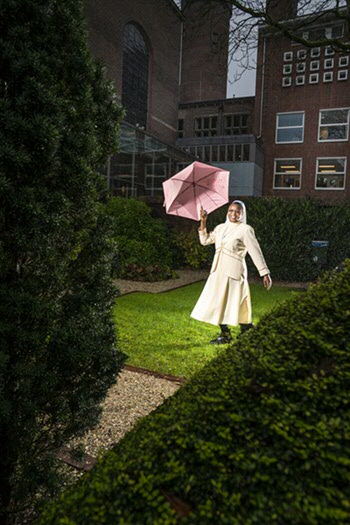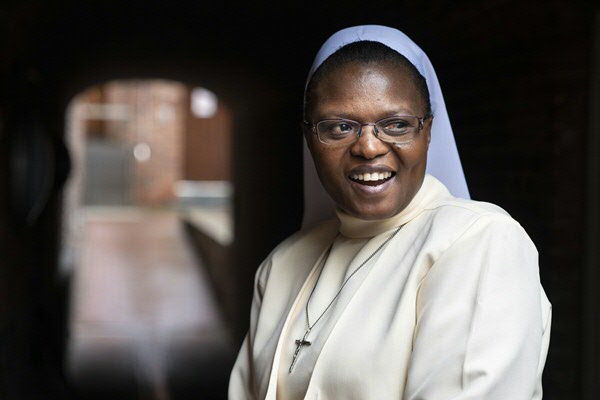Klem tussen kerk en cultuur
Elizabeth Revai Mudzimu groeide op in het zuiden van Zimbabwe waar ze als achtjarig meisje besloot dat ze later non wilde worden. Ze wérd non en gebruikt nu haar promotieonderzoek aan de RUG om andere vrouwen te helpen hun eigen keuzes te maken. Net als zij zelf heeft gedaan.
Toen Elizabeth Mudzimu in 2017 in Groningen aankwam voor haar PhD-onderzoek bij het Centrum voor Religiewetenschap, rilde ze van de kou, ook al was het een zachte dag in mei. Aan die kou is ze nog steeds niet gewend: gehuld in een wollen vest over haar crèmekleurige habijt vertelt ze in haar werkkamer over hoe warm ze in Groningen is ontvangen: ‘Mijn buren repareren mijn fiets, zwaaien me gedag als ik naar mijn werk ga en letten op of ik weer veilig thuiskom.’

Heidense kruiden
Mudzimu’s onderzoek gaat over hoe vrouwen in Zimbabwe omgaan met hun gezondheid en rechten op het gebied van seksualiteit en voortplanting in een gemeenschap die zowel patriarchaal als conservatief is. Aan de ene kant wordt het leven van deze vrouwen gedomineerd door de leer van de katholieke kerk en aan de andere door Afrikaanse culturele gebruiken. Beide bepalen hoe vrouwen met hun seksualiteit omgaan en maar al te vaak botsen die eisen.
Ze benadrukt dat deze vrouwen vaak klem komen te zitten tussen kerk en cultuur. Bijvoorbeeld als ze tijdens hun zwangerschap graag traditionele Afrikaanse kruiden willen gebruiken. ‘Hoewel de katholieke kerk hierover geen expliciete uitspraken doet, geeft de houding van sommige priesters de vrouwen het gevoel dat ze op drijfzand lopen. Ze krijgen te horen dat het gebruik van deze kruiden heidens is. Hoe gaan vrouwen om met dit soort tegenstellingen? Ik hoop dat ik ze kan helpen hun eigen keuzes te maken.’
Spiritueel gesprek
Tijdens haar veldwerk in het noorden van Zimbabwe doet ze onderzoek onder Korekore-vrouwen. Ze neem interviews af, organiseert groepsgesprekken en observeert de vrouwen in hun dagelijks leven. Ze praten over kwesties als seksualiteit, huiselijk geweld en gezondheid. Soms merkt ze dat het voor haar gemakkelijker is om het vertrouwen van vrouwen te winnen omdat ze zowel onderzoeker als non is. ‘Ik ken deze vrouwen van mijn vroegere pastorale werk en ik spreek hun taal. Soms kom ik, als non, voor een pastoraal gesprek en dan zijn ze opeens zo open dat ik allerlei wetenschappelijke data in mijn schoot geworpen krijg. Dan moet ik me wel steeds bewust zijn van het feit dat ik een onderzoeker ben en dus zorgvuldig met die data moet omgaan.’
Groot gezin
Na twee jaar onderzoek kreeg Mudzimu een krachtige openbaring. Ze besefte dat onderzoekers, zij zelf ook, naar vrouwen in Zimbabwe kijken door de ogen van activisten in plaats van onderzoekers, waardoor ze alleen zien wat ze verwachten: vrouwen die worden onderdrukt en niet zelfstandig kunnen handelen. ‘Tijdens mijn veldonderzoek zag ik juist iets heel anders. Zoals de Nigeriaanse romanschrijfster Chimamanda Ngozi Adichie het noemt, keek ik naar een enkel verhaal, zonder een kritische analyse toe te passen en zonder rekening te houden met factoren als taal en culturele context. Als we alleen naar vrouwen kijken vanuit het perspectief van één verhaal, dan doen we die vrouwen tekort, omdat we dan niet luisteren naar de verhalen die ze níet vertellen.’
Zo kwam ze vrouwen tegen die op verschillende manieren proberen om onder de eisen van man en kerk uit te komen. ‘Veel vrouwen in Zimbabwe willen graag een groot gezin met veel kinderen, omdat ze zich daardoor sterker voelen. Dus als hun mannen zeggen dat twee kinderen wel genoeg is, halen ze de pil - laten zelfs aan hun man zien dat ze die ook echt nemen -maar ondertussen zorgen ze ervoor dat de pil niet werkt. Als ze dan toch zwanger worden, doen ze net alsof ze stomverbaasd zijn. Dit bewijst dat ze veel sterker en zelfstandiger zijn dan ik had verwacht.’
Mudzimu komt zelf uit een gezin met tien kinderen en ze weet dus goed wat dat voor vrouwen betekent. Ze gaat daarom in gesprek met de vrouwen in haar onderzoek over het maken van verstandige keuzes. ‘Is een groot gezin de enige manier om sterker in je schoenen te staan? Wat zijn alternatieven? Hoe kan je als vrouw je rechten opeisen op het gebied van seksualiteit en voortplanting op een manier die op de lange termijn houdbaar is? Tijdens mijn workshops wil ik ze graag helpen om met meer zelfvertrouwen hun eigen keuzes te maken.’

Sustainable PhD Grant
Dit najaar was Mudzimu een van de zes winnaars van een Sustainable Society PhD Grant: een beurs van 2500 euro voor haar onderzoeksvoorstel. En vervolgens won ze ook nog eens de bonusprijs van 1000 euro voor de meest overtuigende pitch. ‘Dat was een geweldige verrassing. Met dat extra geld kan ik mijn onderzoek laten visualiseren. Dat komt me goed van pas als ik terugga.’ Ze heeft nog twee jaar te gaan om haar onderzoek af te ronden en haar proefschrift te schrijven. Maar eerst gaat ze dankzij het winnen van deze beurs terug naar Zimbabwe voor een tweede ronde veldonderzoek.
Roeping
‘Voor mij is onderzoek meer dan het toevoegen van kennis aan de wetenschap. Ik wil echt invloed hebben op de levens van mensen. Als ik klaar ben met mijn PhD, dan ga ik nadenken over hoe ik door kan gaan met het helpen van de minderbedeelde vrouwen van Zimbabwe. Misschien kan ik een postdoc gaan doen, een boek schrijven of kleine beurzen aanvragen om een platform op te zetten waarmee ik de empowerment van vrouwen kan bevorderen.’
Onderzoek is voor haar net zozeer een roeping als haar leven als een katholieke non. ‘Er is tijd om naar de kerk te gaan, er is tijd voor gebeden en er is tijd voor onderzoek, lezen en schrijven. Als ik ga hardlopen in het Noorderplantsoen, bid ik tijdens het lopen. En als ik klaar ben met mijn rozenkrans, dan ren ik door en denk ik na over mijn onderzoek.’ Ze vouwt haar handen: ‘Al die bezigheden hangen met elkaar samen.’
Kerstmis
Begin december is Mudzimu voor twee maanden naar Zimbabwe vertrokken om haar workshops te geven en kerst te vieren in haar klooster en thuis met haar familie. Kerst doet haar denken aan haar kindertijd: iedereen ging in een nieuwe jurk naar de kerk en haar moeder bakte traditionele taarten: ‘Dan maakte ze het deeg klaar, deed het in een gat in de grond en maakte het vuur erboven aan. O, wat smaakten die taarten goed. De hele familie kwam bij elkaar om naar de kerk te gaan, samen te eten en te dansen. Ik ben trouwens een uitstekende danser.’
Tegenwoordig heeft Kerst een nieuwe betekenis voor haar: ‘Kerstmis geeft me de kans om echt na te denken over wat het christendom voor mij inhoudt. Ik reik andere mensen de hand om samen de vreugde te beleven die de geboorte van Jezus brengt. Kerst betekent samen kerstliederen zingen om die vreugde uit te drukken en extra mijn best doen om die vreugde met andere mensen te delen.’
Over Elizabeth Revai Mudzimu
Mudzimu groeide op in Masvingo in het zuiden van Zimbabwe, vlakbij Zuid-Afrika. Toen ze acht jaar was, besloot ze non te worden, maar ze moest wachten tot haar zeventiende om toe te mogen treden tot het klooster. In 2010 legde ze haar gelofte af en werd ze opgenomen in de orde van Little Children of our Blessed Lady. Na haar middelbare school verhuisde ze naar Harare om Religiewetenschap te studeren aan de universiteit. Ze behaalde haar onderwijsbevoegdheid en gaf les aan een grote middelbare school. Na haar masterdiploma wilde ze haar onderzoek voortzetten en kwam ze via NUFFIC bij toeval in Groningen terecht. In de vakgroep Comparative Study of Religion werkt ze onder begeleiding van Joram Tarusrira en Kocku von Stuckrad aan haar PhD.
Tekst: Marjan Brouwers, foto's: Reyer Boxem
Bron: Broerstraat 5
